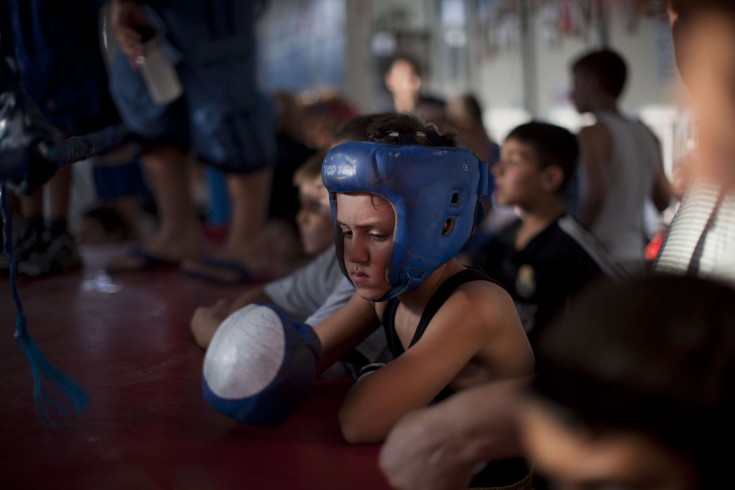When I started this blog series I deliberately chose to name it "Pint-Sized PHENOMS" and not "Pint-Sized PRODIGIES." I think the word prodigy has so many connotations and can put undue pressure on children to meet a certain standard both now and in the future. It is only certain fields that are amenable to creating prodigies (notably music and chess, mainly because of their rule-bound nature) and kids can excel and be phenomenal in a variety of fields, like volunteering, that don't lend themselves to a prodigy label. Plus, the label "prodigy" has an expiration date while being phenomenal at something can happen throughout the life course. This week I was reminded why I dislike the word prodigy. Zoe Thomson has been getting a lot of Internet attention. She's an eight-year-old guitar player getting the prodigy label.
While Thomson's number o f viewers continues to increase I can't help but think about the long-term implications of being labeled a music prodigy. For instance, people will make assumptions about her and her family's mental health and social skills. Especially after this study was published last month in Intelligence. The study finds that prodigies are more likely to have autistic family members and it's gotten a fair amount of attention (here's the Slate article).
I don't think those findings would apply to sports prodigies though, as the focus there is more on physical prowess. Take 12-year-old Travis Wittlake, Jr., just featured in Sports Illustrated as a "future game changer." He's already won back-to-back national titles in all three types of wrestling. His father is a former wrestler and a wrestling coach, so that's his family connection. Travis has been in the spotlight since he was 7 (see video below) so let's hope he can handle the increasing pressures he'll face from his family and the public as rising national star.
Proving that being an early standout doesn't just apply to boys when it comes to strength sports, 10-year-0ld Naomi Kutin is truly amazing. She's been breaking weight-lifting records for the past few years (while still observing the Jewish Sabbath, which is significant because she can't compete in the many competitions that are held on Saturdays). Her family seems amazingly supportive and wise-- especially her mom, who you can see in this video below.
Note that, like Wittlake, Kutin's father is a weight-lifter, which has surely helped her technique and passion. (Personal question: I wonder how Orthodox the Kutins are given Naomi's weightlifting attire?)
Another set of religious athletes who I would consider phenoms for a different reason are the boys featured in this Time LightBox feature on the National Youth Boxing Championship held last week in Acre, Israel.
The boys, aged 9-13, were Jews and Arabs who squared off in the ring together-- fighting without incident and without politics.
The upcoming Olympics offer another opportunity for sports to transcend politics. This week the US team was finalized and its rosters boost some pint-sized phenoms (and, yes, prodigies). At 15 swimmer Katie Ledecky is the youngest team member. She'll be racing in the 800-meter freestyle and many would call her a prodigy. Interestly, girls the same age, like gymnast Kyla Ross, aren't considered prodigies since their sport favors the small and young; veteran Alicia Sacramone, at 24, didn't make the five-member gymnastics squad, which is made up entirely of teenagers. Just goes to show you can be young and phenomenal, but not a prodigy (Note: for more on Sacramone's coach, Mihai Brestyan, who'll be at the Olympics with his new 18-year-old star Aly Raisman, check out my recent piece in Boston Magazine!)

